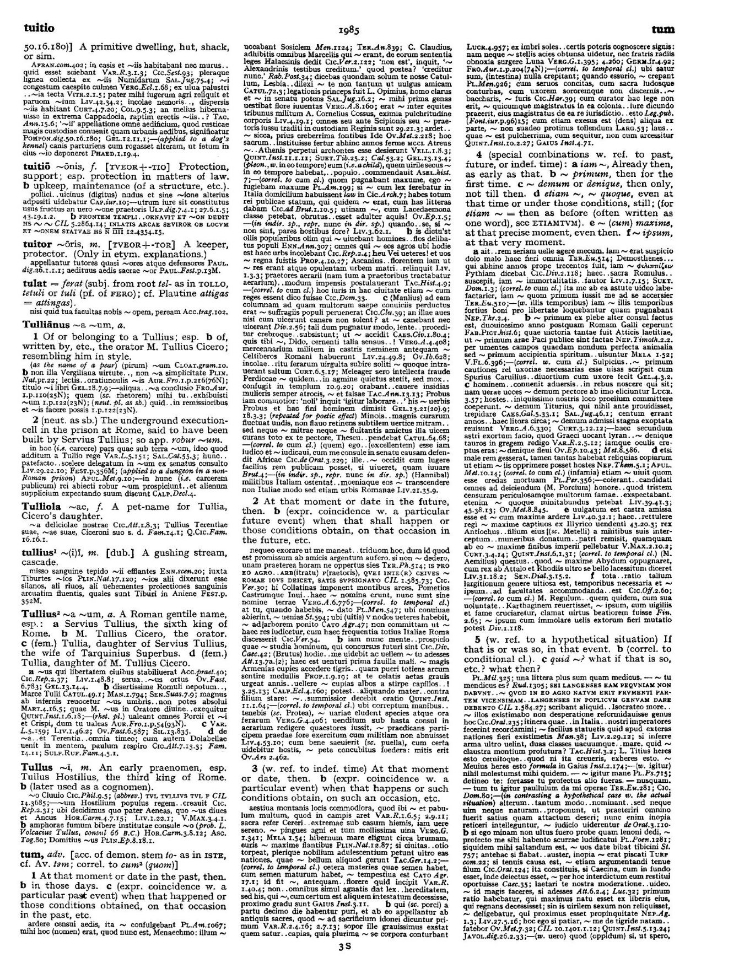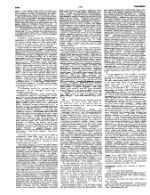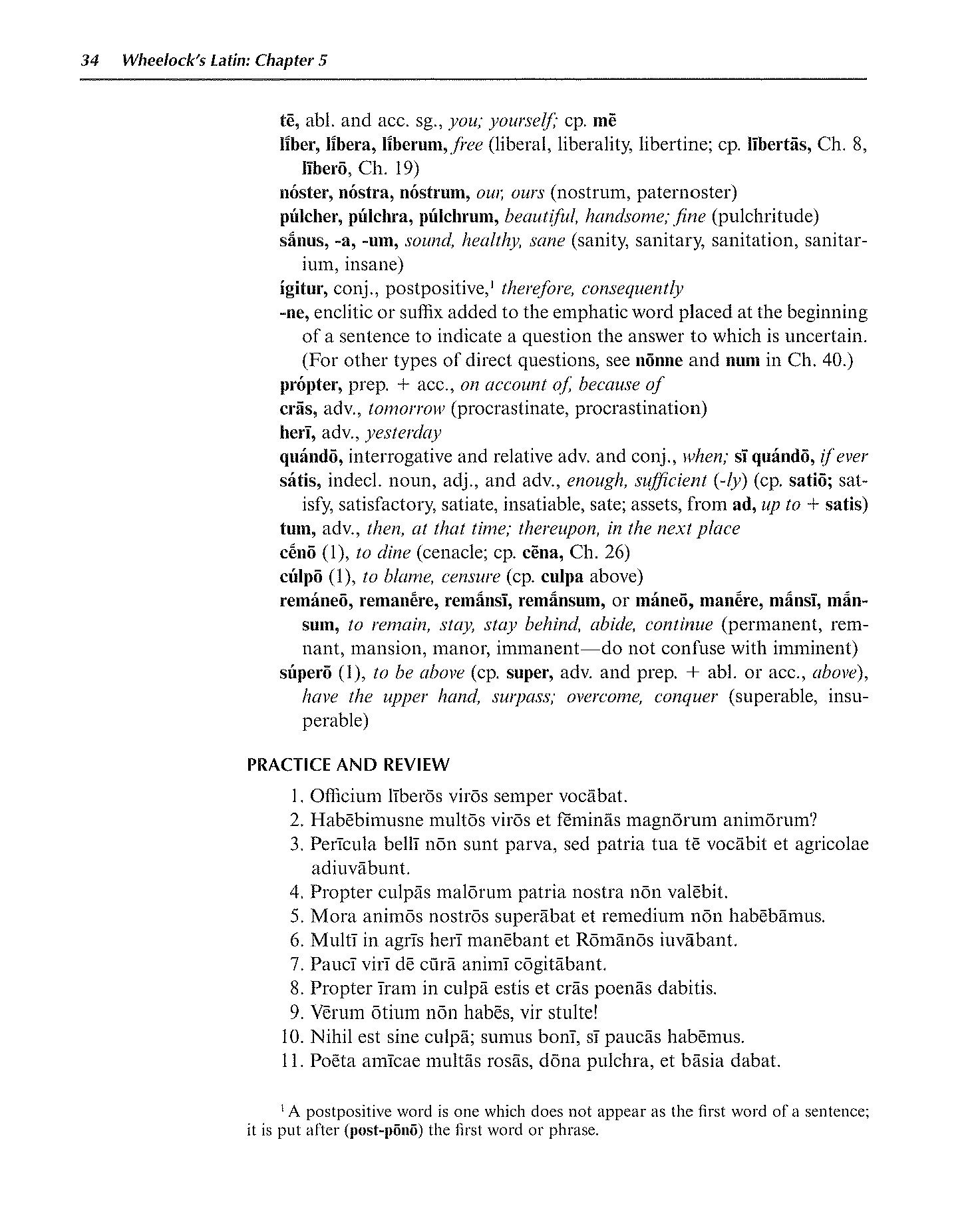
page_listing.tpl
page_subListingDetails.tpl
sub_listingDetails_style1.tpl
sub_listingDetails.title.tpl
tum then
tum is a Latin Adverb that primarily means then.
Definitions for tum
Wheelock's Latin
Adverb
- 1
then, at that time, thereupon, in the next place
Oxford Latin Dictionary
Adverb
- 1
At that moment or date in the past, then. (b) in those days. (c) (expr. coincidence w. a particular past event) when that happened or those conditions obtained, on that occasion in the past, etc.
- 2
At that moment or date in the future, then. (b) (expr. coincidence w. a particular future event) when that shall happen or those conditions obtain, on that occasion in the future, etc.
Sentences with tum
Latin to English
Cōgitem nunc dē hāc rē, et tum non errābo.Compare Let me now think about this matter, and then I will not make a mistake.
Cum ad illum locum vēnerant, tum amīcōs contulerant.Compare Not only had they come to that place, but they also brought their friends. (or When they had come to that place they had brought their friends.)
Cum vincimus, tum pācem spērās.Compare When (while) we are winning, you are (at the same time) hoping for peace.
Aperte mala cum est mulier, tum demum est bona.Compare Only when a woman is openly bad is she really good.
Tum vos universus iterum a ego conservo res publica conclamo.Compare Then you all cried out together that the state had been again saved by me.
Tum, in conspectus omnis, creber caelum cado lapis.Compare Then, in the sight of all, stones fell thickly from the sky.
Tum vinco cupio, tum dux tu vinco.Compare We both wish to conquer, and especially to conquer under your command.
Tum subito tempestas coorior magnus.Compare Then suddenly very violent storms arose.
Data sources
Notes
- Definitions
- Frederick M. Wheelock, Wheelock's Latin, 6th ed., rev. Richard A. LaFleur (New York, NY: HarperCollins Publishers, 2005): 34.
- P. G. W. Glare, Oxford Latin Dictionary, Vols. 1-8 (Oxford: Clarendon Press, 1982): 1985.
- Word frequencies
- Christopher Francese, "Latin Core Vocabulary," Dickinson College Commentaries, last modified 2014, http://dcc.dickinson.edu.
- Paul B. Diederich, The Frequency of Latin Words and Their Endings, PhD diss., (Columbia University, 1939).
- Louis Delatte, Suzanne Govaerts, Joseph Denooz, and Etienne Evrard, Dictionnaire fréquentiel et index inverse de la langue latine [Frequency Dictionary and Inverse Index of the Latin Language] (Liège, Belgium: Laboratoire d'analyse statistique des langues anciennes de l'Université de Liège [L.A.S.L.A.], 1981): 119.
Bibliography
Allen, Joseph H. Allen and Greenough's New Latin Grammar for Schools and Colleges: Founded on Comparative Grammar. Edited by James B. Greenough, George L. Kittredge, Albert A. Howard, and Benjamin L. D'Ooge. Boston, MA: Ginn & Company, 1903.
Crystal, David. A Dictionary of Linguistics and Phonetics. 6th ed. Oxford, UK: Blackwell Publishing, 2008.
Delatte, Louis, Suzanne Govaerts, Joseph Denooz, and Etienne Evrard. Dictionnaire fréquentiel et index inverse de la langue latine [Frequency Dictionary and Inverse Index of the Latin Language]. Liège, Belgium: Laboratoire d'analyse statistique des langues anciennes de l'Université de Liège (L.A.S.L.A.), 1981.
Diederich, Paul B. The Frequency of Latin Words and Their Endings. PhD diss., Columbia University, 1939.
Francese, Christopher. "Latin Core Vocabulary." Dickinson College Commentaries. Last modified 2014. http://dcc.dickinson.edu/latin-vocabulary-list.
Gildersleeve, Basil L., and Gonzales Lodge. Gildersleeve's Latin Grammar: Third Edition, Revised, and Enlarged. 3rd ed. London, England: Macmillan and Co., 1903.
Glare, Peter G.W. Oxford Latin Dictionary. Vols. 1-8. Oxford, England: Clarendon Press, 1982.
Krüger, Bernd. "Latin Conjugation Tables." Cactus2000. Accessed May 5, 2023. https://latin.cactus2000.de/index.en.php.
Pierson, Nick. "Sound of Text." Accessed October 26, 2019. https://soundoftext.com.
Wheelock, Frederick M. Wheelock's Latin. 6th ed. Revised by Richard A. LaFleur. New York, NY: HarperCollins Publishers, 2005.
Wiktionary Contributors. "Victionarium." Wikimedia Foundation, Inc. Updated March 18, 2019. https://la.wiktionary.org/wiki/Victionarium:Pagina_prima.
Citation
Chicago (17th ed.)
Allo Contributors. "tum (adv.) - Latin Word Definition." Allo Latin Dictionary. Last modified . Accessed January 30, 2026. http://ancientlanguages.org/latin/dictionary/tum.
Entry created on . Last updated on .








